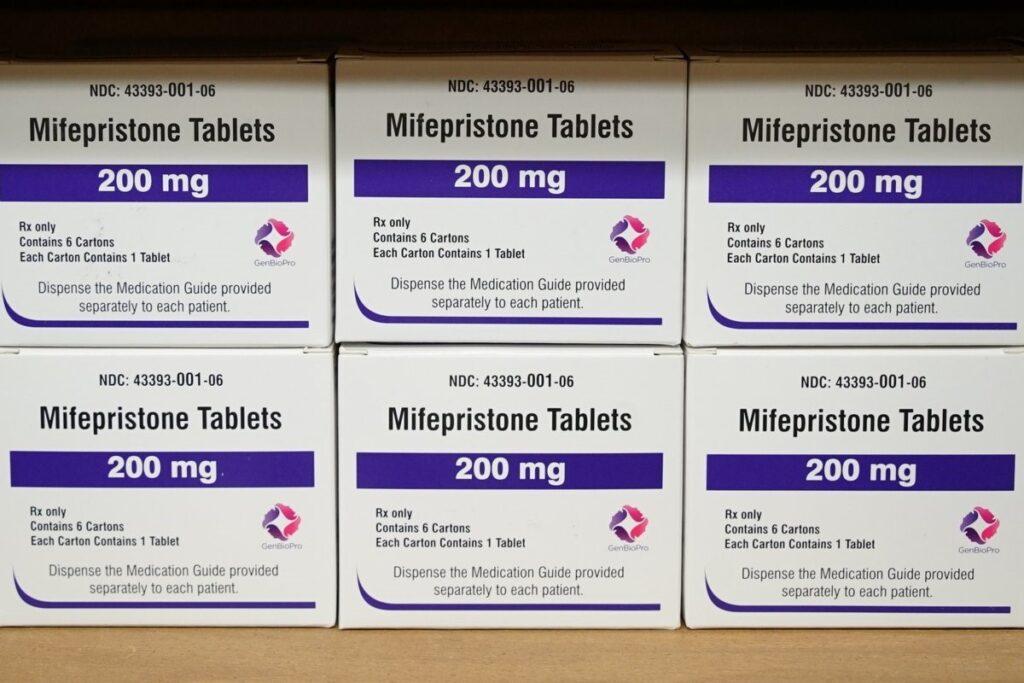The future of abortion access in the United States is up in the air as the Supreme Court decides whether or not to uphold a Texas judge’s block of the Food and Drug Administration’s (FDA) approval of mifepristone, the first of a two-pill sequence used for medication abortions.
The Supreme Court has extended the hold placed on the Texas ruling from April 19 to April 21 at 11:59 pm to give justices more time to make a decision in the case.
The drug in question, mifepristone, has been widely used for medication abortions since its introduction to the market in 2000. It is the most common drug used in medication abortions, which account for more than half of abortions in the U.S. Since the rulings, the FDA has defended mifepristone, saying the drug is “safe and effective.”

Lauryn Ping (CAS ’23), the vice president of H*yas For Choice, Georgetown University’s reproductive justice organization, said the potential restrictions on access to the pill has caused concern among students.
“Limiting access to abortion could create more anxiety amongst Georgetown students about sex and the potential of having an unwanted pregnancy. The importance of using contraceptives will be much greater,” Ping said in an interview with The Hoya. “This decision further perpetuates a stigma around sex on campus that is unwarranted.”
“There are power dynamics that come into play since not everyone has the ability to ask their partner to wear condoms,” Ping added.
Mifepristone, which has been widely used for medication abortions for over two decades, blocks the hormone progesterone, a hormone necessary for maintaining a pregnancy. The pill is usually followed within 48 hours by misoprostol, which causes contractions in order to facilitate an abortion.
Rebecca Reingold, Associate Director at the O’Neill Institute for National and Global Health Law, said rollbacks over the access to the drug will have serious implications for college students.
“Together, the Texas court’s and Fifth Circuit’s decisions would severely restrict access to mifepristone for all college students, regardless of where they reside,” Reingold wrote to The Hoya.
“Limiting the medication’s use to through 7 weeks’ gestation, for example, curtails access to essential reproductive health services for pregnant college students, many of whom do not know they are pregnant so early on,” Reingold added.
Mifepristone was first blocked on April 7 by Judge Matthew Kacsmaryk, who sits on the U.S. District Court for the Northern District of Texas. Kacsmaryk, who was appointed by former President Donald Trump, blocked the drug on the basis that the FDA used an accelerated approval process, lacking research into any potentially harmful side effects of the drugs.
Major adverse events related to mifepristone are exceedingly rare, according to the American Medical Association (AMA), and occur in just 0.3% of cases. The major adverse event rate of giving birth ranges from 0.4%-3.6%.
A federal judge on the Fifth Circuit Court in Washington, on the same day as the Texas ruling, ruled that no restrictions should be placed on mifepristone access in 17 states, including the District of Columbia.
Lawrence Gostin, director of the World Health Organization Collaborating Center on Public Health Law and Human Rights and faculty director of the O’Neill Institute for National and Global Health Law, said that the Texas court’s decision to prohibit access to mifepristone would lead to serious health ramifications.
“Banning or placing restrictions on an FDA approved medicine like mifepristone has severe consequences for access to safe abortions,” Gostin wrote in an email to The Hoya. “It also places the pregnant person’s health, or even life, at risk.”
For students who are worried about access to the pill, Gostin said that at the moment in Washington, D.C., access to the pill is still legal.
“At present, D.C. law holds firm. Unless the Supreme Court sides with the Fifth Circuit, there should be unrestricted access to abortion medications in the District,” Gostin wrote.
Sara Collina, a lawyer and professor in Georgetown’s Women’s and Gender Studies department, said government agencies, such as the FDA, are important in ensuring the safety of medicines in various fields.
“When you need a cavity filled, you know your dentist has a license for that work. When you buy a painkiller at the store, you know a government agency reviewed the research to be sure the drug can do more good than harm,” Collina added.
Ping called on those without the capacity for pregnancy to support those directly impacted by the ongoing rulings.
“Oftentimes the onus is placed on people with the capacity for pregnancy, so I think now is a really great time for people who can’t get pregnant to step up and use contraception and make sure they practice safe sex — lifting the burden of dealing with this alone,” Ping said.








